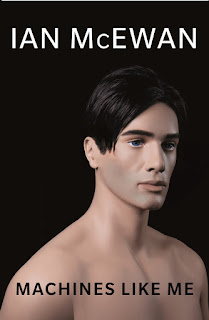Machines Like Me

Ian McEwan writes about human dramas involving love and violence with force majeure, and Machines like Me does not let the McEwan reader down. Published in the year after the bicentennial of Mary Shelley’s Frankenstein , McEwan’s narrator, thirty-two year old Charlie – has a background in anthropology and an interest in electronics. His girlfriend, Miranda, is writing a PhD on the Corn Laws – a subtle connection to Shelley’s context. More directly, although not the inventor/creator of Adam, Charlie is his human God in that he and Miranda make choices about Adam’s personality, nurture the first stages of his life and slowly introduce him to the world. Like the Creature, Adam's consciousness comes in stages, while his conscience – if we can call it that—centres on relentless algorithms of truth. Then there are questions about monstrosity – the potential of the muscular Adam to break and arm and worse; the introduction of a rapist and the monsters of the age (war, the monstrosit...